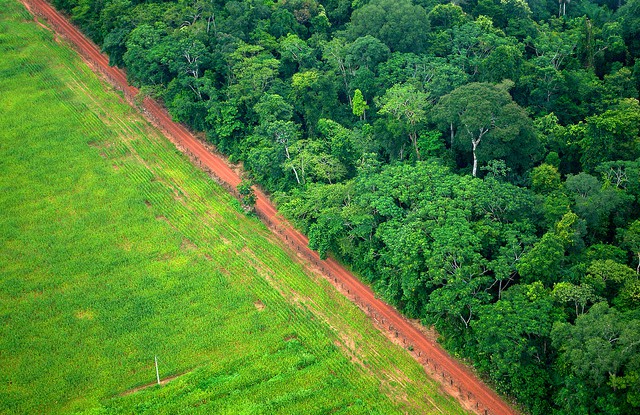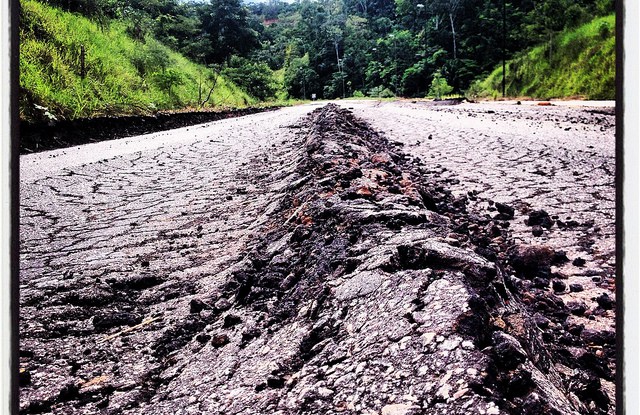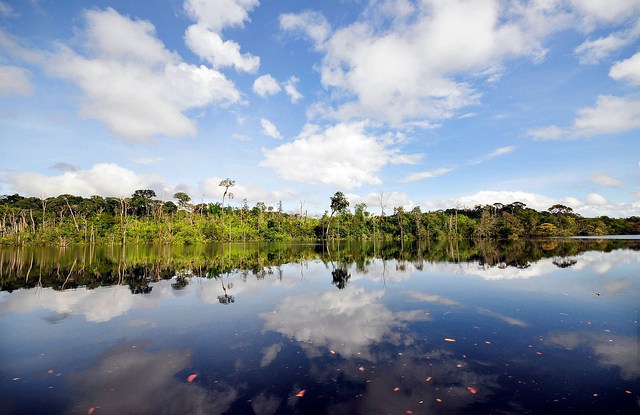BOGOR, Indonesia — Climate policy will require greater engagement from the scientific community — and an upcoming high-level forum can help to chart “where the science-policy interface needs to go on forestry issues,” said Louis Verchot, Director of Forests and Environment Research at the Center for International Forestry Research (CIFOR).
“As we move past 2015, the UN negotiations are going to be shifting gears from big international negotiations to implementation at national and sub-national scales,” Verchot said in an interview with CIFOR’s blog, Forests News. “So it is a good time to ask how science can be more effective to support policy on tropical forests and help the international community be more effective in dealing with climate change.”
Verchot will represent CIFOR at the Colloquium on Forests and Climate at Columbia University on 24 September and will lead the wrap-up discussion at the end of the event. The Colloquium panel will include six thought leaders on climate who will present their ideas on how to map out the future of climate research. The event will take place one day after the UN Climate Summit.
“We want more people to understand, we want more people to care,” Verchot said. “The more people that understand science, the easier it’s going to be for society to move towards a solution.”
An edited transcript of the interview follows.
Q: What’s your vision for this event?
A: The aim is to engage with key thinkers on forest and climate change issues to help set the agenda for science to support more effective policy making and implementation on issues related to forestry and climate change. Ultimately we hope to contribute to raising ambition at the UN Climate Change Summit that will be held in New York that same week to get countries committed to making the UNFCCC process successful.
We organized this meeting to engage with stakeholders in different scientific disciplines on these climate change issues. We’ve been talking about climate change and forests primarily at the UNFCCC meetings, and this summit gives us the opportunity to engage a wider audience in New York.
The fact that UN General Assembly is taking up the issue will help raise awareness of forestry in the climate change agenda. But effective policy making requires greater scientific engagement, so we’d like this meeting to help set out the vision for where the science-policy interface needs to go on forestry issues.
As we move past 2015, the UN negotiations are going to be shifting gears from big international negotiations to implementation at national and sub-national scales. So it is a good time to ask how science can be more effective to support policy on tropical forests and help the international community be more effective in dealing with climate change.
Q: Will forests get a mention at the UN meeting?
A: Yes, definitely. Forestry, agriculture and land use are still 25 percent of greenhouse gas emissions globally, they’re just as important as energy-related emissions – so they cannot be ignored. At the same time, it’s always more delicate, because these emissions mainly come from developing countries, and these countries are facing various economic challenges. Measures to reduce greenhouse gas emissions cannot challenge their food security, and they need their environmental integrity to pursue their development aspirations.
In addition, forestry is one of the areas that UNFCCC has been most effective in moving forward; they have not made as much progress on fossil fuels.
Forests are a major safety net in the climate system, absorbing about 35-45 percent of all fossil fuel emissions through forest growth, and keeping them out of other places in the biosphere where they do damage. When carbon dioxide ends up in the ocean, acidification results, which can damage coral reefs and affect shellfish. When you store it in soils it’s easily reversible. The only place to safely store carbon in the biosphere is in forests.
Q: How did you choose the six speakers?
A: We looked at the different scientific disciplines that we thought would be able to contribute to some new thinking to identify the types of scientists we wanted to see around the table – a mix of biophysical and social scientists. So we knew for example that Carlos Nobre, a Brazilian climate scientist, has been talking about the need for transformational change in our society. He makes the connection between climatology and the needs of society.
We want more people to understand, we want more people to care – the more people that understand science, the easier it’s going to be for society to move towards a solution
Eduardo Brondízio has worked on community rights, collective rights, and climate change issues, so he’s been thinking about a lot of these social issues that we want to see integrated. Daniel Nepstad is an internationally recognized leader on forest issues, with broad experience across the tropical forests from the Amazon to Southeast Asia, and is thinking about the issues from an ecological viewpoint.
All of these people are thinking about the science policy interface – and that’s key for this event; it’s not just science for the sake of knowledge, but science to achieve a more sustainable world.
We’ve invited John Holdren, who was the head of Woods Hole Research Center, a professor at Berkeley and at Harvard, and who’s now running the Office of Science and Technology Policy for President Barack Obama. He will be able to contribute reflections on his own area of work around sustainable energy supply systems and on scientific support for informed policy making, which is exactly his role now.
So those were the elements – leading interdisciplinary thinkers in their field, who also understand where science and policy come together.
Q: What do you hope people take away from the event?
A: I hope they take away a renewed intellectual interest in these subjects. The reason we’re making this public is really about outreach and awareness raising. We aren’t very active in US circles on policy; we do a lot more in Europe, so this is an opportunity to reach out to an American audience and stimulate this debate, and move into a deeper intellectual examination of these issues.
I think Columbia University (home of the Earth Institute) is a great place to be doing this – the institution has a long history of connecting nationally and internationally on important policy issues. So we hope that in bringing this event to Columbia will draw the attention of an American audience to the issues.
We want more people to understand, we want more people to care – the more people that understand science, the easier it’s going to be for society to move towards a solution.
Q: What is CIFOR’s relationship with the Earth Institute and what will working together help to achieve?
A: It’s growing into a really nice partnership. I’m really excited about our ideas to try to generate appropriate climate science for action on the ground, and connecting that with our work on ecosystem-based climate change adaptation approaches.
Columbia can help us develop a more refined understanding of the types of stresses that we can expect climate change to pose in the landscapes where we working, and the types of stresses that climate variability will pose on production systems and livelihoods.
Columbia also has some leading scientists on tropical land use and land-use change who are connecting with the research agendas of our scientists working in the Amazon, India, Africa and Southeast Asia.
So this partnership will help to make us much more effective with our approaches to climate change adaptation and mitigation.
Q: Why is it important to have events like this Colloquium?
A: We’re bringing together some innovative thinkers that we don’t often have the chance to engage with, to listen to what they have to say so we can integrate new ideas with what CIFOR and our partners are doing intellectually.
It’s about getting that debate happening in New York around such a big event as New York’s Climate Week and the [UN] summit so that the voice from the tropics is heard, as well. I think that tends to get lost sometimes when these issues are debated in developed countries.
Certainly fossil fuel emissions in developed countries and emerging economies are important, but with population growth still high in developing countries and economic development progressing, we need policy solutions that not only address today’s problems, but that anticipate the issues that will arise over the next two decades.
Events like this can certainly can be flashpoints, and I think when you bring people of this caliber together from different disciplines, we expect to find synergies between what the social scientists are talking about, what the biophysical scientists, like the climatologists and the foresters, are talking about – so I think it can go a long way.
I’m really excited about this event. I think we have a lot to say to the world, and there’s a lot the world needs to hear.
For more information about the Colloquium on Forests and Climate, click here.
We want you to share Forests News content, which is licensed under Creative Commons Attribution-NonCommercial-ShareAlike 4.0 International (CC BY-NC-SA 4.0). This means you are free to redistribute our material for non-commercial purposes. All we ask is that you give Forests News appropriate credit and link to the original Forests News content, indicate if changes were made, and distribute your contributions under the same Creative Commons license. You must notify Forests News if you repost, reprint or reuse our materials by contacting forestsnews@cifor-icraf.org.


